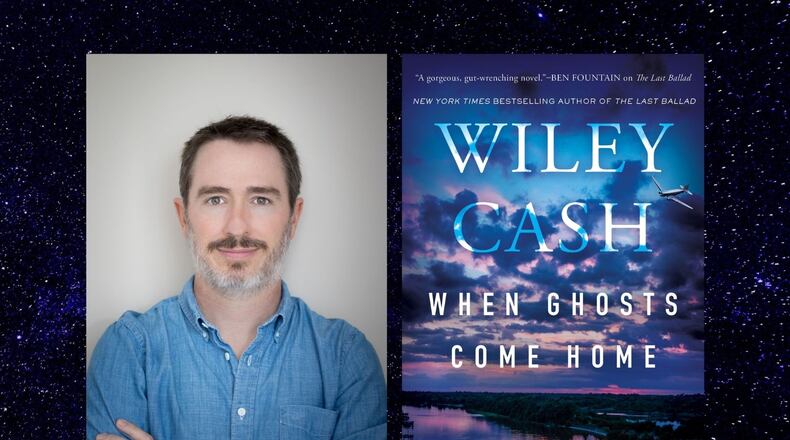In bed in the wee hours of the morning when nothing good ever comes, Sheriff Winston Barnes hears a plane flying overhead, way too low and way too late for an incoming flight at the small local airport in Oak Island, North Carolina.
When he goes out to investigate, he can sense “the inky black roll of the water, the thin, ghostly silhouettes of pine trees.” He smells the trees and “the moss that hung from them, the brackish air coming from the waterway behind him, the salty tang of the ocean on the other side of the island.”
You can almost discern the ghost of old Pat Conroy roaming through those trees, and he can be glimpsed at times throughout this novel. But “When Ghosts Come Home” by Wiley Cash is a crisp, tightly edited 304 pages. Or as Conroy would have called it, “Chapter One.”
When Winston investigates, he finds a crashed World War II DC-3 cargo plane, without a trace of crew or cargo and wiped clean of fingerprints. Nearby is the body of Ralph Bellamy, a local African-American man with no record or criminal associates, with a wife and new baby at home. He has been shot through the chest.
So we have a murder and a mystery, and both will be solved, but Cash is up to much more in his gripping, multi-layered fourth novel about the South and race and how the past keeps a grip on the present.
Cash teaches fiction writing and literature at the University of North Carolina-Asheville, where he is the alumni author-in-residence. All of his novels have been set, immersed really, in real towns in North Carolina. His previous novel, “The Last Ballad,” a harrowing historical fiction about unionizing in 1929, was an American Library Association Book of the Year. His earlier two novels, “This Dark Road to Mercy” and “A Land More Kind Than Home,” racked up so many literary awards he probably needed to add a room to hold them all.
Winston is as bone-deep decent as he can be. He’s also somewhat rare for a hero, a tired but still vital 63-year-old man with a wife of 40 years, Marie, who has cancer. When they make the movie, and “Ghosts” seems structured to transition easily to the screen, think Sam Waterston of a few years back.
After Cash gets us completely invested in Winston, he switches point-of-view to two other characters in alternating chapters. Next up is the Barnes’ daughter Colleen, living in Texas with her attorney husband. She has recently suffered a miscarriage, and her grief continues to weigh more than she can carry. When she came home from the hospital, she stayed downstairs while her husband closed the door to the elaborately decorated nursery they had prepared upstairs. Later, she stuffed a rolled towel at the bottom of the nursery door. “She did not want to go in, but she also did not want whatever remained inside the room — memory, magic, hope, perhaps a spirit or a ghost — to escape.”
This is not a ghost story in the usual sense. But it is, in its way, a ghost story.
Drinking too much and thinking none too clearly, Colleen sneaks away from home one night to return to her parents’ house, where she can sleep in her old bed, for reasons she does not understand, except that she needs to.
The third point-of-view character is Jay, a teen trying to stay out of trouble and not succeeding very well. Back in Decatur, he got into a stupid minor scrape and his no-nonsense folks decided he should sever all ties with his peers and go live for a while in Oak Island with his much older sister Janelle and her husband Ralph — as in the late Ralph Bellamy, whose body is found at the airport,
Bored and restless, Jay has no real connections, which is not a good state for a teen trying to stay out of trouble. Especially an African-American teen on an island where the local rednecks still like to do a little late-night drive-by intimidation to enforce their view of the natural order of things and spew the n-word.
Their leader is Bradley Frye, who ticks all the boxes on the Southern literary fiction checklist for a nasty good ol’ boy: He’s a Rebel flag-flying bigot, a smug, entitled, angry-for-no-reason son of a rich daddy, a land developer who is destroying natural areas so he can get richer selling tract homes. Bradley is also running against Winston for sheriff, and unless Winston can solve the murder and the mystery of the empty airplane, he is likely to be defeated. Which would mean Winston loses his job and his insurance that covers his wife’s cancer treatment, and Oak Island gets a very bad new sheriff.
So, no stress.
Some readers may be taken aback by the abrupt gut-punch ending; I was at first. But as I mulled it over for several days — and that says a lot about the power of the book — I understood it was not capricious. Cash was setting it — and us — up all along, and it was as inevitable as nightfall in late autumn, when the ghosts come out.
FICTION
By Wiley Cash
Morrow
304 pages, $28.99
About the Author
The Latest
Featured

